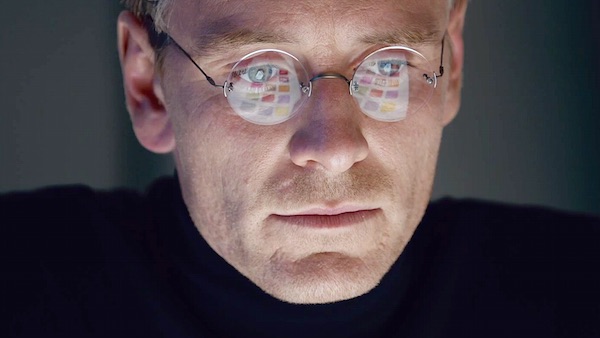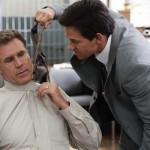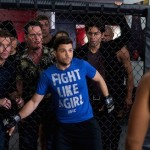Steve Jobs Review
Posted on November 28, 2015 By John Gilpatrick 2015, Movie Reviews, New Releases
End-to-end control. It’s a personal computing philosophy that drove Steve Jobs and comes up regularly as a point of confrontation in the movie Steve Jobs. Many of his contemporaries and colleagues felt end-to-end control, which restricts a device’s compatibility with other devices, would significantly narrow a user’s possibilities. And that’s exactly what happened, but Jobs wasn’t deterred — despite getting fired — and years later, his vision proved fruitful as millions upon millions became Apple devotees without a care for what’s compatible or incompatible.
It’s an interesting piece of phrasology — end-to-end control — that comes up throughout Aaron Sorkin’s Steve Jobs script because his words and the way they’re spoken convey such an intense control over character and environment. And Jobs himself is a man driven by control. For him, a life without complete and utter control over what you do and when and why is almost not a life worth living. As such, nearly everyone in his life is a treated like a persistant horsefly — some kind of nuisance that’s delaying his inevitable Michaelangelo- or Einstein-like greatness.
Steve Jobs does an excellent job at bringing us into the behind-the-scenes life of Steve Jobs. The man most of us knew wore the black turtleneck and jeans on a California stage while showing us what we’d be spending our next $250 on. He was an innovator who unquestionably changed the way most of us live our lives, but he was also a really difficult man, an abusive boss, and a negligent father. By taking us behind the scenes of three famous product launches — the Macintosh (1984), the NeXT Black Cube (1988), and the iMac (1998) — we’re able to see what drove the man at some of his most professionally critical and personally stressful points.
It also gives Sorkin and director Danny Boyle a unique canvas to paint on that maximizes the film’s urgency and plays to both men’s strengths. Sorkin’s a wordy guy, and while Boyle’s films recall intimacy that’s more of an emotional nature than a physical one, there is 127 Hours, in which a guy is trapped under a boulder, and Sunshine, in which a group of scientists are confined to a space station on their way to our closest star. In Steve Jobs, there’s a lot of walking and talking — TM Aaron Benjamin Sorkin — but it’s also peppered with moments of heart-on-your-sleeve clarity, which is a Boyle special. That said, the director plays the writer’s game more than it is the other way around, and their inability to completely reconcile their differences is probably the reason this film doesn’t hit the highs of The Social Network, which is thematically and topically very similar. As good as Steve Jobs is, it lives in David Fincher’s film’s shadow, as well as the shadow of other, better-constructed, more lived-in Sorkin scripts. (Hi, Moneyball!)
Michael Fassbender brings it all to life with a verve I’m not sure we’ve ever seen him with on the screen before. It’s a dynamic performance from an actor that understands the type of film he’s in and what that film expects of him. He’s matched in most scenes by Kate Winslet (and only in some scenes by Kate Winslet’s Polish accent). Her Joanna Hoffman is a wonderful foil for Jobs, and also the tether he needs to keep him from simply floating into an oblivion of ideas.
Seth Rogen, Jeff Daniels, and Katherine Waterston are Jobs’ other, less welcome foils as Apple co-founder Steve Wozniak, one-time Apple CEO John Sculley, and Lisa’s mother Chrissan, respectively. All three have their moments.
It was nice to see Jobs grow as a person over the course of the film, and that supports the very “Boyle-ian” idea that we need human connections to make us better creators, innovators, adventurers, and thinkers. It’s alongside and with the support of others that our greatest achievements happen, and while the film takes a somewhat ham-fisted road to share that sentiment with us, it’s one that lingers and feels good over closing credits.
I think Steve Jobs is probably the definitive cinematic portrait we’ll ever get of this man’s life (though others have tried, and as others still will no doubt try in the future), and it’s a very enjoyable, well-made film. It falls into a very nice rhythm about halfway through that makes you wish it would keep going into the iPod and iPhone years, but maybe that’s for next time.
2015, 3 Stars, Aaron Sorkin, Alwin H. Küchler, Daniel Pemberton, Danny Boyle, Elliot Graham, Jeff Daniels, John Ortiz, Kate Winslet, Katherine Waterston, Makenzie Moss, Michael Fassbender, Michael Stuhlbarg, Perla Haney-Jardine, Ripley Sobo, Sarah Snook, Seth Rogen, Steve Jobs

















Pingback: Reviews: Steve Jobs (2015) – Online Film Critics Society